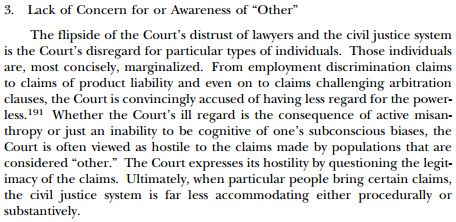I’ve earnestly and objectively examined posited rates of false allegations in recent months, because statistics and analytics are what we soonest regard as estimates of the truth. It’s typical of writers hostile to the notion that false allegations are rampant, as well as of legal analysts and social scientists, to cite such rates, particularly official approximations of the incidence of false claims of rape and domestic violence.
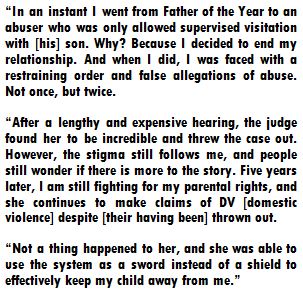 What even very balanced and cogent analyses of these rates fail to observe, however, is that not all false allegations are of crimes and not all false allegations of crimes are criminally alleged, that is, false allegations of crimes may very conveniently be made through the civil court on restraining/protection order applications (as may be false allegations of every other kind). The number of criminal claims rejected or discredited by the police, then, is not an accurate measure or reflection of the prevalence, nature, or magnitude of false allegations.
What even very balanced and cogent analyses of these rates fail to observe, however, is that not all false allegations are of crimes and not all false allegations of crimes are criminally alleged, that is, false allegations of crimes may very conveniently be made through the civil court on restraining/protection order applications (as may be false allegations of every other kind). The number of criminal claims rejected or discredited by the police, then, is not an accurate measure or reflection of the prevalence, nature, or magnitude of false allegations.
It doesn’t, in fact, scratch the surface.
Allegations made pursuant to the procurement of a civil restraining order are never dismissed by the police (and plaintiffs may bypass the police entirely). Unless a complainant seeks to have someone criminally charged, the police have nothing to do with it. Their role is simply that of usher. They steer the complainant toward the courthouse. And if a restraining/protection order is obtained (or possibly just alleged to have been obtained) by a complainant, police inclination is to credit his or her allegations on reflex, because they’ve been conditioned to accept restraining order applicants’ claims at face value, that is, as legitimate.
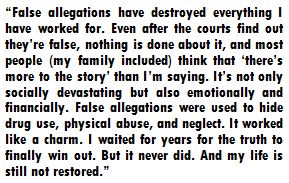 Because the truth or falsity of allegations is irrelevant in civil proceedings, there are no comprehensive statistics relating to false allegations made on restraining orders. The awarding of restraining orders is grounded on the forcefulness of plaintiffs’ allegations and judicial discretion. It might be possible to determine how many restraining order applications nationwide were rejected in a given period; it’s impossible, however, to determine how many were rejected because judges determined their allegations to be false (rather than just insufficient), or how many were approved in spite of false allegations.
Because the truth or falsity of allegations is irrelevant in civil proceedings, there are no comprehensive statistics relating to false allegations made on restraining orders. The awarding of restraining orders is grounded on the forcefulness of plaintiffs’ allegations and judicial discretion. It might be possible to determine how many restraining order applications nationwide were rejected in a given period; it’s impossible, however, to determine how many were rejected because judges determined their allegations to be false (rather than just insufficient), or how many were approved in spite of false allegations.
There is no accurate assessment of the volume or degree of lying in civil court. Significantly, too, false allegations made in civil court may easily evolve into criminal allegations that stick, despite those criminal allegations’ original premises’ having been trumped-up.
Journalists who address the subject of false allegations, typically focusing on rape, are prone to dismiss the charge that false allegations are commonplace based on how few plaintiffs are prosecuted for bringing fraudulent allegations. The false assumption of these investigators is that fraudulent allegations are necessarily prosecuted when detected. The fact is that even false allegations of rape may only rarely be prosecuted (see, for example, this case, in which allegations were determined to be unfounded and cost their plaintiff $55,000 but weren’t deemed grounds for the plaintiff’s being prosecuted for perjury). False allegations of sorts other than rape may never be acknowledged as false by judges, let alone deemed grounds for prosecution by district attorneys’ offices (which couldn’t care less). So the equation prosecutions for false allegations are rare = false allegations are rare is flatly wrong.
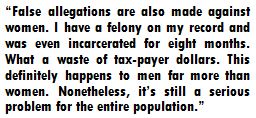 Isolated, regional studies have been performed by governmental agencies, including one in West Virginia that famously concluded that four out of five (domestic violence) restraining orders were either “unnecessary” or fraudulently based. Since an estimated two to three million restraining orders are issued each year in the United States alone, however, even national scrutiny of every restraining order issued in a given week for false allegations would be impracticable.
Isolated, regional studies have been performed by governmental agencies, including one in West Virginia that famously concluded that four out of five (domestic violence) restraining orders were either “unnecessary” or fraudulently based. Since an estimated two to three million restraining orders are issued each year in the United States alone, however, even national scrutiny of every restraining order issued in a given week for false allegations would be impracticable.
Restraining order rulings—disregarding how they’re perceived by the accused and how others perceive the accused because of them—aren’t determinations of guilt or innocence, as criminal rulings are. Restraining order rulings are at best kinda-sorta judgments based on plaintiffs’ persuasiveness.
Even that’s overly dignifying a process that’s initiated on the basis of a brief, one-sided interview of five or 10 minutes that results in the issuance of an order of the court that its defendant may be granted only a half-hour hearing to challenge (and only half of that 30 minutes is afforded to the defendant’s presentation). The idea that restraining order rulings are the products of scrupulous deliberation is beyond absurd.
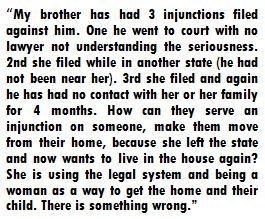 To repeat, there is no accurate assessment of the volume or degree of lying in civil court. And it’s worthy of repeated observation, moreover, that when false allegations succeed in restraining order adjudications, defendant susceptibility to false criminal allegations increases exorbitantly, so prejudicially is the procurement of a restraining order regarded. How handily restraining orders are obtained and how carelessly their merits are ruled upon are conveniently disregarded after the fact. The next judge down the line is authorized to assume that the original allegations validated by the previous judge were in effect “true.”
To repeat, there is no accurate assessment of the volume or degree of lying in civil court. And it’s worthy of repeated observation, moreover, that when false allegations succeed in restraining order adjudications, defendant susceptibility to false criminal allegations increases exorbitantly, so prejudicially is the procurement of a restraining order regarded. How handily restraining orders are obtained and how carelessly their merits are ruled upon are conveniently disregarded after the fact. The next judge down the line is authorized to assume that the original allegations validated by the previous judge were in effect “true.”
The system is rigged both to guillotine the falsely accused and to ensure that false allegations are never discerned or acknowledged as such. The conception is marvelously diabolical, and its effectiveness is witnessed by the fact that the restraining order process has hummed along without a hitch for decades in spite of its being outrageously slack and tendentious (even while levying monstrous sanctions).
Where honest parties with an interest in social justice should seek an estimate of the volume, degree, and consequence of lying is in the testimonies of defendants and the lawyers who (sometimes) represent them—who, in the latter case, if they’re honest (and many are), will readily own that exploitive and malicious use of restraining orders is unexceptional, particularly in family court.
That statistics themselves lie shouldn’t be a novel proposition to anyone. The truly desolating fact to everyone who’s been lied about is that purveyors of statistics of false allegations may not have the least idea that their denial of the rampancy of lying invalidates the trials and torments of multitudes of victims.
Copyright © 2014 RestrainingOrderAbuse.com

 subject to criminal charges that can result in incarceration, he has a right to appointed counsel, but where an indigent individual is subject to civil proceedings where incarceration is a consequence, he does not. In other words, criminal and civil proceedings have different rules, and the right to appointed counsel is no exception. This Article argues that because the consequence of these proceedings is exactly the same, the right to appointed counsel should be the same. Prison is prison. This consequence, and not just doctrinal distinctions, should guide the Court’s analysis in deciding whether an indigent individual receives appointed counsel. By systematically examining the Court’s narratives in both criminal and civil right-to-counsel cases, this Article seeks to determine why the Court continues to treat the same situation so differently. The Court states that it is driven solely by doctrine, but it uses radically different language to discuss the individuals, attorneys, and nature of the proceedings in the criminal versus civil setting. This Article argues that the Court’s different goals in the criminal and civil context better explain the Court’s approach than doctrinal distinctions alone. With criminal cases, its goal is legitimacy, while with civil cases, its primary goal is efficiency.
subject to criminal charges that can result in incarceration, he has a right to appointed counsel, but where an indigent individual is subject to civil proceedings where incarceration is a consequence, he does not. In other words, criminal and civil proceedings have different rules, and the right to appointed counsel is no exception. This Article argues that because the consequence of these proceedings is exactly the same, the right to appointed counsel should be the same. Prison is prison. This consequence, and not just doctrinal distinctions, should guide the Court’s analysis in deciding whether an indigent individual receives appointed counsel. By systematically examining the Court’s narratives in both criminal and civil right-to-counsel cases, this Article seeks to determine why the Court continues to treat the same situation so differently. The Court states that it is driven solely by doctrine, but it uses radically different language to discuss the individuals, attorneys, and nature of the proceedings in the criminal versus civil setting. This Article argues that the Court’s different goals in the criminal and civil context better explain the Court’s approach than doctrinal distinctions alone. With criminal cases, its goal is legitimacy, while with civil cases, its primary goal is efficiency.